Low Fat Diet for Dogs: Essential Tips and Best Low Fat Food Options for a Healthy & Happy Pup!
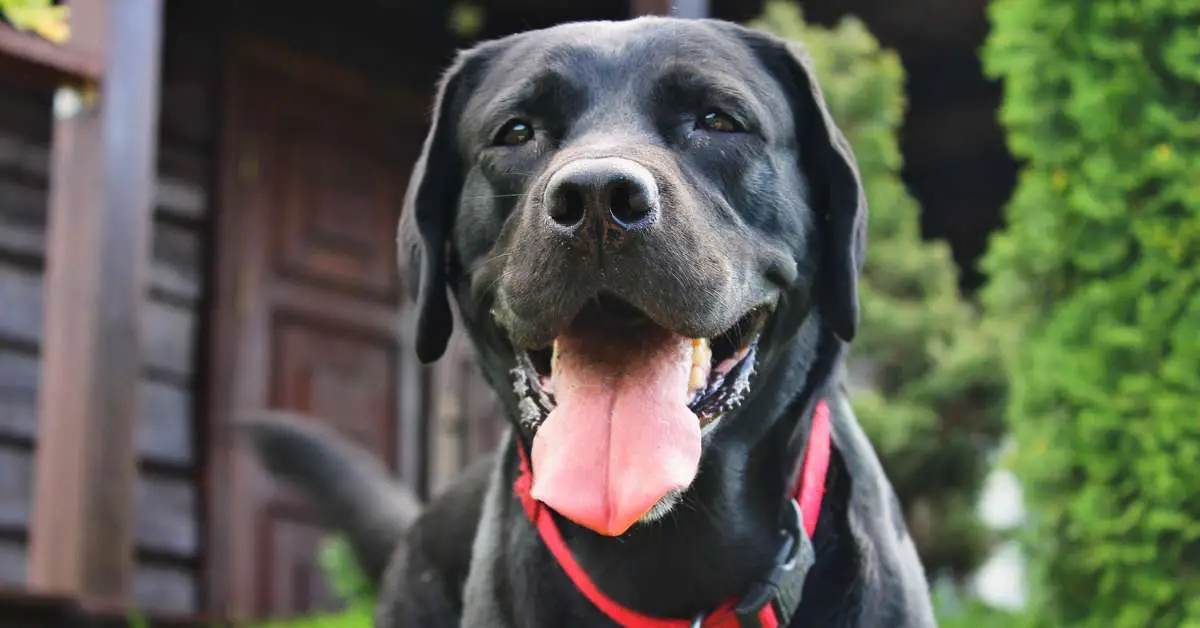
Step into a world where tails wag endlessly and joy knows no bounds!
As devoted pet parents, our furry companions hold a special place in our hearts, and their well-being is a top priority. Just like us, dogs require a balanced diet to lead a happy and healthy life.
While there are numerous dietary options out there, one approach that’s been gaining significant attention and reaping immense benefits is the Low Fat Diet for Dogs.
In this tail-wagging blog post, we dive deep into the world of low-fat nutrition and how it can dramatically improve your canine companion’s quality of life.
Whether you have a plump pooch needing to shed a few pounds or a furry friend with a sensitive stomach, understanding the ins and outs of this diet will prove to be a game-changer.
Unleash a vibrant transformation for your four-legged friend as we explore the delectable delights, valuable insights, and the joy of watching them thrive on a low-fat diet. Get ready to discover a healthier and happier life for your furry friend, one paw at a time!”
Does Your Dog Need a Low Fat Diet?
As devoted pet owners, we strive to provide the best possible care for our furry companions.
One important aspect of their well-being is their diet, as nutrition plays a significant role in their overall health.
While some dogs thrive on regular diets, others may benefit from a low-fat diet for various reasons.
But how do you know if your dog needs a low-fat diet?
Signs that Your Dog May Need a Low-Fat Diet:
1. Weight Management Issues: If your dog is struggling with weight gain or obesity, a low-fat diet could be beneficial. A low-fat formula can help reduce calorie intake while providing essential nutrients, supporting healthy weight management.
2. Gastrointestinal Sensitivities: Dogs with sensitive stomachs or gastrointestinal issues, such as chronic diarrhea or vomiting, might benefit from a low-fat diet. Lowering fat content can ease digestion and reduce the risk of gastrointestinal upsets.
3. History of Pancreatitis: Dogs with a history of pancreatitis or prone to this condition require a low-fat diet to minimize the strain on their pancreas. High-fat diets can trigger pancreatitis flare-ups and cause severe discomfort.
4. Liver Disease: In some cases of liver disease, a low-fat diet may be recommended to reduce the workload on the liver and support liver function.
5. Breed Predispositions: Certain dog breeds, such as Miniature Schnauzers, Yorkshire Terriers, and Shetland Sheepdogs, are more susceptible to pancreatitis and may benefit from a low-fat diet
8 Best Low Fat Dog Foods
As responsible pet owners, ensuring our beloved canine companions receive the best possible nutrition is essential for their overall well-being.
For some dogs, particularly those with certain health conditions or a tendency to gain weight, a low-fat diet is recommended to maintain a healthy weight and support their optimal health.
But with the myriad of dog food options available, finding the best low-fat dog food can be a daunting task.
To simplify your search and prioritize your pet’s health, we’ve compiled a list of the top-rated low-fat dog foods on the market:
1. Blue Buffalo Life Protection Formula Healthy Weight Dog Food
Blue Buffalo is renowned for its premium-quality dog foods, and their Healthy Weight formula is no exception. Crafted with real chicken, wholesome grains, and a precise blend of nutrients, this recipe supports weight management without compromising on taste or nutrition.
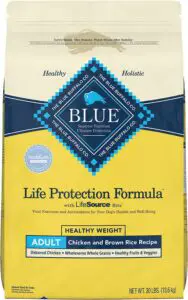
2. Hill’s Science Diet Perfect Weight Dog Food
Hill’s Science Diet is a trusted name in the pet food industry, and their Perfect Weight formula is tailored to help dogs achieve and maintain a healthy weight. Its blend of high-quality ingredients and balanced nutrition ensures your dog stays in top shape.
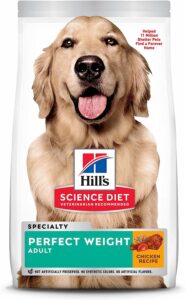
3. Wellness CORE Grain-Free Reduced Fat Dog Food
This grain-free option from Wellness CORE is perfect for dogs with grain sensitivities and those needing a low-fat diet. It features a high protein content to support lean muscle mass and healthy energy levels.
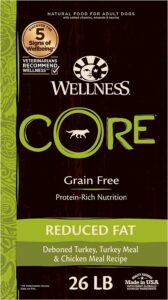
4. Merrick Grain-Free Healthy Weight Recipe
Merrick’s grain-free Healthy Weight Recipe offers a delicious blend of real deboned beef and fresh produce. It’s packed with vitamins, minerals, and joint-supporting ingredients to keep your furry friend active and vibrant.
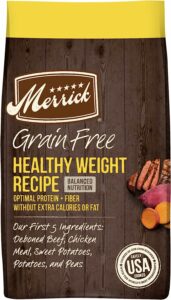
5. Nutro Ultra Weight Management Dog Food
Nutro Ultra’s Weight Management formula combines lean proteins, whole grains, and a blend of superfoods to maintain a healthy weight while supporting overall vitality.
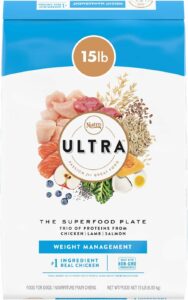
6. Royal Canin Veterinary Diet Gastrointestinal Low Fat Dog Food
For dogs with specific gastrointestinal needs, this veterinary diet from Royal Canin provides excellent support. It’s formulated to be highly digestible and gentle on sensitive stomachs.
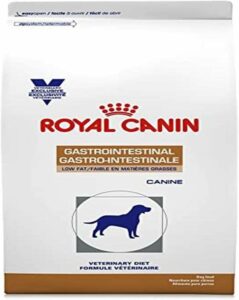
7. Natural Balance Fat Dogs Low-Calorie Dry Dog Food
As the name suggests, Natural Balance Fat Dogs formula is designed specifically for weight management. It contains a reduced calorie and fat content while still delivering a delicious taste your dog will love.
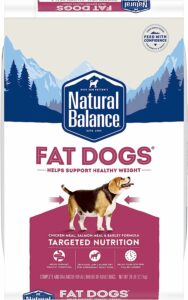
8. Solid Gold Fit & Fabulous Low Fat/Low Calorie with Fresh Caught Alaskan Pollock
This low-fat, low-calorie option from Solid Gold features real Alaskan Pollock as the primary protein source. It’s ideal for weight control without compromising on taste.
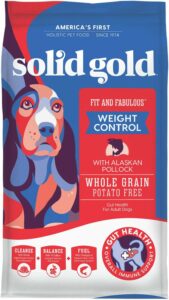
Before making any changes to your dog’s diet, it’s essential to consult with your veterinarian to determine if a low-fat diet is appropriate for your furry friend’s specific needs.
Factors such as age, breed, activity level, and existing health conditions should all be taken into consideration.
Remember, a healthy and happy dog starts with proper nutrition. By choosing one of the best low-fat dog foods listed above and ensuring regular exercise, your furry friend will be well on their way to a vibrant and fulfilled life by your side.
Few Low-Fat Dog Food Recipes
When it comes to nourishing our furry friends, providing a balanced and nutritious diet is of utmost importance.
For dogs with weight management concerns or those requiring low-fat foods due to certain health conditions, homemade low-fat dog food recipes can be a wonderful solution.
Preparing a low-fat recipe for your canine companion allows you to have full control over the ingredients, ensuring they get the best care and nutrition possible.
Here are some wholesome and delicious low-fat dog food recipes to try:
1. Turkey and Sweet Potato Delight
Ingredients:
- 1 pound ground turkey
- 1 cup sweet potatoes, peeled and diced
- 1 cup green beans, chopped
- 1/2 cup carrots, diced
- 1/2 cup peas
- 2 cups low-sodium chicken broth
Instructions: In a large skillet, cook the ground turkey until fully browned and no longer pink. Drain any excess fat. Add the sweet potatoes, green beans, carrots, peas, and chicken broth to the skillet.
Simmer the mixture over medium heat until the vegetables are tender and the flavors are well combined. Let the mixture cool before serving it to your dog. Store any leftovers in the refrigerator.
2. Chicken and Rice Medley
Ingredients:
- 1 pound boneless, skinless chicken breasts, cooked and shredded
- 2 cups brown rice, cooked
- 1 cup spinach, chopped
- 1/2 cup carrots, grated
- 1/4 cup low-sodium chicken broth
Instructions: In a large bowl, combine the cooked and shredded chicken with the cooked brown rice. Stir in the chopped spinach, grated carrots, and chicken broth. Mix everything thoroughly until well combined.
Serve this tasty medley to your dog after it has cooled down. Refrigerate any leftovers for future meals.
3. Fish and Quinoa Feast
Ingredients:
- 1 pound white fish fillets (such as cod or tilapia), cooked and flaked
- 1 cup quinoa, cooked
- 1/2 cup zucchini, diced
- 1/2 cup broccoli, chopped
- 1 tablespoon olive oil
- 1 cup water or low-sodium fish broth
Instructions: In a skillet, sauté the diced zucchini and chopped broccoli in olive oil until tender. Add the cooked and flaked fish, cooked quinoa, and water or fish broth to the skillet.
Cook the mixture over low heat until everything is heated through and well combined. Allow the dish to cool before serving it to your dog. Any leftovers can be stored in the refrigerator.
Important Tips: Always consult your veterinarian before introducing homemade meals, especially if your dog has specific dietary requirements or health concerns.
Avoid using ingredients that are toxic to dogs, such as onions, garlic, grapes, raisins, chocolate, and artificial sweeteners (xylitol).
Balance is key: Ensure the recipes provide the necessary nutrients, including protein, carbohydrates, fats (in moderation), vitamins, and minerals.
Cooking homemade low-fat dog food can be a rewarding experience, strengthening the bond between you and your loyal companion.
Remember to monitor your dog’s weight and health regularly to ensure the chosen recipes meet their specific needs.
With love and care in the kitchen, you’ll be serving up healthy and delightful meals that keep those tails wagging!
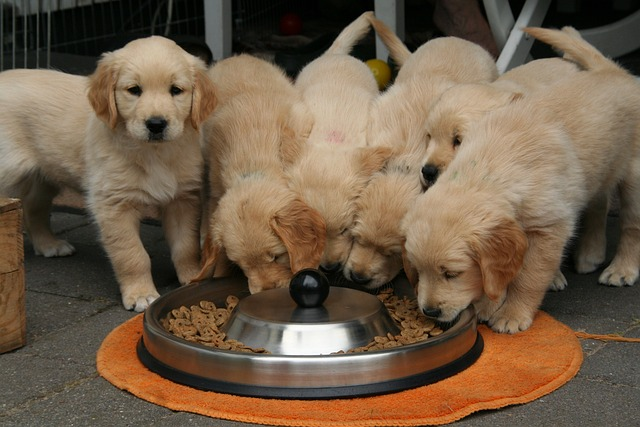
Why Switch to a Low-Fat Dog Food? Benefits for Your Furry Friend’s Health and Happiness
As responsible pet owners, we strive to provide our beloved dogs with the best possible care, including their nutrition.
For some dogs, a low-fat diet can offer a range of benefits that contribute to their overall health and well-being.
Whether your canine companion needs to manage their weight or has certain health conditions, making the switch to low-fat dog food can be a game-changer.
Here are some compelling reasons to consider this dietary change:
1. Weight Management: Just like humans, some dogs are prone to weight gain, which can lead to various health issues, including joint problems, heart disease, and diabetes. A low-fat diet can help your furry friend maintain a healthy weight, as it reduces the caloric intake from fats while still providing essential nutrients.
2. Digestive Health: Dogs with sensitive stomachs or gastrointestinal conditions can benefit from a low-fat diet. Lower fat content is easier for the digestive system to process, reducing the risk of digestive upsets, diarrhea, or vomiting. This can be particularly beneficial for dogs with chronic pancreatitis or other digestive disorders.
3. Decreased Risk of Pancreatitis: Pancreatitis is a condition where the pancreas becomes inflamed, leading to severe abdominal pain and discomfort for your dog. High-fat diets are a known risk factor for pancreatitis, and switching to low-fat dog food can help reduce the chances of this painful condition.
4. Improved Cardiovascular Health: A low-fat diet can promote heart health in dogs. Diets rich in healthy fats, such as omega-3 fatty acids, can support cardiovascular function, reducing the risk of heart-related issues and promoting a healthy heart.
5. Better Energy Levels: Low-fat dog foods often focus on providing lean protein and complex carbohydrates, which can help maintain steady energy levels throughout the day. This is particularly important for active dogs or working breeds that require sustained energy.
6. Suitable for Specific Health Conditions: Some health conditions, such as pancreatitis, hyperlipidemia, and certain liver diseases, require a low-fat diet as part of the treatment plan. Switching to a specialized low-fat dog food can help manage these conditions and improve your pet’s quality of life.
7. Enhanced Coat and Skin Health: Many low-fat dog foods contain essential fatty acids, like omega-3 and omega-6, which play a crucial role in maintaining a healthy coat and skin. These nutrients can reduce itching, and dryness, and promote a shiny, lustrous coat. Before making any dietary changes, it’s essential to consult with your veterinarian.
They can assess your dog’s individual needs, conduct any necessary health evaluations, and provide guidance on the most appropriate low-fat dog food for your furry friend. Moreover, low-fat dog food can offer numerous advantages, from weight management and digestive support to promoting heart health and overall vitality.
By switching to a well-balanced and nutritious low-fat diet, you’re taking a proactive step towards ensuring a healthier, happier, and more vibrant life for your beloved canine companion.

7 Best Low-Fat Dog Food for Pancreatitis
Pancreatitis is a painful and potentially life-threatening condition in dogs that occurs when the pancreas becomes inflamed.
One of the key components of managing this ailment is providing a low-fat diet to reduce stress on the pancreas.
If your furry friend has been diagnosed with pancreatitis or is prone to this condition, choosing the right low-fat dog food can make a world of difference in their well-being.
Diet for dogs with pancreatitis:
1. Hill’s Prescription Diet i/d Digestive Care Low Fat
Hill’s Prescription Diet i/d Digestive Care Low Fat is specifically designed to support dogs with gastrointestinal issues, including pancreatitis. Its low-fat content aids in easier digestion and reduces the risk of triggering pancreatitis flare-ups. Additionally, it includes essential nutrients to promote overall health.
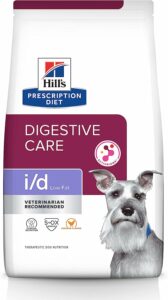
2. Royal Canin Veterinary Diet Gastrointestinal Low Fat
Royal Canin’s Veterinary Diet Gastrointestinal Low Fat formula is expertly crafted to be gentle on the digestive system while providing balanced nutrition. It contains prebiotics to support healthy digestion and a carefully regulated fat content to manage pancreatitis symptoms.

3. Blue Buffalo Basics Limited Ingredient Diet Grain-Free Turkey & Potato
Blue Buffalo Basics Limited Ingredient Diet offers a grain-free option with a limited number of ingredients, making it suitable for dogs with food sensitivities or allergies. The low-fat turkey and potato recipe provides essential nutrients without causing additional stress to the pancreas.
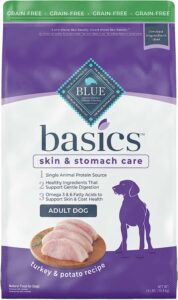
4. Purina Pro Plan Veterinary Diets EN Gastroenteric Low Fat
Purina Pro Plan Veterinary Diets EN Gastroenteric Low Fat is specially formulated for dogs with gastrointestinal issues, including pancreatitis. It contains a moderate level of fat and easily digestible ingredients to support digestive health.
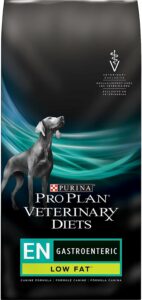
5. Natural Balance L.I.D. Limited Ingredient Diets Sweet Potato & Fish Formula
Natural Balance L.I.D. Sweet Potato & Fish Formula offers a balanced and limited ingredient option for dogs with pancreatitis. The low-fat fish and sweet potato blend provides essential nutrients while minimizing fat intake.
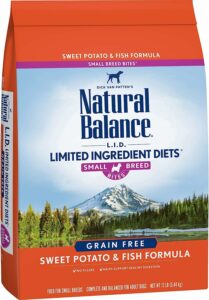
6. Wellness Simple Limited Ingredient Diet Grain-Free Salmon & Potato
Wellness Simple Limited Ingredient Diet is grain-free and designed to be gentle on sensitive stomachs. The low-fat salmon and potato recipe provides quality nutrition without triggering pancreatitis symptoms.
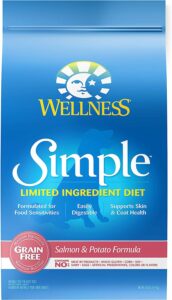
7. Nutro Limited Ingredient Diet Grain-Free Adult Lamb & Sweet Potato
Nutro Limited Ingredient Diet offers a grain-free option for dogs with pancreatitis. The low-fat lamb and sweet potato recipe contain essential vitamins and minerals to support your dog’s overall health.
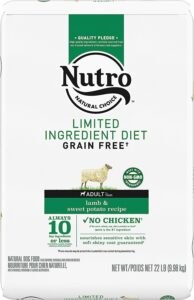
Before making any dietary changes, always consult with your veterinarian to ensure that the selected best low-fat dog food aligns with your pet’s specific needs and medical history.
Regular monitoring and follow-up with your vet are vital to gauge the effectiveness of the chosen diet in managing pancreatitis and maintaining your furry friend’s well-being.
A compassionate approach to your dog’s nutrition can significantly improve their quality of life, and choosing the best low-fat dog food for pancreatitis plays a crucial role in their road to recovery and a happier, healthier future.
Understanding the Ideal Fat Content for Your Dog’s Diet
When it comes to our canine companions’ nutrition, striking the right balance in their diet is vital for their overall health and well-being.
“Low fat” is a term commonly used in pet food labels and recommendations.
Understanding what fat content is considered low fat is crucial in providing the best care for our furry friends.
Generally, dog food is considered low fat if it contains a fat content significantly lower than the average fat content found in regular dog foods.
While there are no universal guidelines or regulatory standards for what constitutes low-fat dog food, a common consensus among veterinarians and pet nutrition experts is that dog foods with fat content below 10-12% on a dry matter basis (DMB) can be considered low-fat.
Dry matter basis refers to the percentage of nutrients in a food without accounting for its water content.
Fat is an essential nutrient for dogs, just as it is for humans. It serves several critical functions in their bodies, including providing a concentrated source of energy, supporting healthy skin and coat, aiding in the absorption of fat-soluble vitamins (A, D, E, and K), and contributing to various metabolic processes.
However, excessive fat intake can lead to weight gain, obesity, and related health issues.
For some dogs, especially those with certain health conditions like pancreatitis or gastrointestinal sensitivities, a diet with lower fat content is necessary to avoid exacerbating these conditions.

Considerations for Your Dog’s Individual Needs:
It’s essential to recognize that not all dogs require a low-fat diet. Each dog is unique, and their nutritional requirements can vary based on factors such as age, breed, activity level, and any existing health conditions.
If your dog has specific health concerns, such as pancreatitis or obesity, or if they have difficulty digesting regular dog food with higher fat content, a low-fat diet might be a suitable option.
However, before making any dietary changes, it is crucial to consult with a veterinarian to determine the most appropriate fat content and overall nutrition for your dog’s specific needs.
FAQs
1. Is a low-fat diet suitable for all dogs?
While a low-fat diet can be beneficial for dogs with specific health conditions or weight management needs, it may not be suitable for every dog.
It’s essential to consult with a veterinarian before making any dietary changes. Factors such as age, breed, activity level, and existing health conditions should be considered to determine if a low-fat diet is appropriate for your individual dog.
2. How do I know if my dog needs a low-fat diet?
Signs that your dog may benefit from a low-fat diet include weight gain, digestive issues, recurrent pancreatitis, or certain liver diseases.
However, only a veterinarian can properly diagnose and recommend a low-fat diet based on your dog’s specific health needs.
3. Can I prepare homemade low-fat meals for my dog?
Yes, homemade low-fat meals can be an option, but it’s crucial to ensure they meet all of your dog’s nutritional requirements.
Unbalanced diets can lead to deficiencies or health issues. Always consult with a veterinarian or a veterinary nutritionist to create safe and nutritious homemade recipes tailored to your dog’s needs.
4. Are there any potential risks associated with a low-fat diet for dogs?
While a low-fat diet can offer various health benefits, it’s essential to strike a balance and avoid extremely low-fat levels.
Dogs still require essential fatty acids for coat and skin health, among other vital functions. Working with a veterinarian ensures that your dog’s diet remains balanced and supportive of its overall well-being.
5. Can I mix low-fat dog food with regular dog food?
Mixing low-fat dog food with regular dog food is generally not recommended, as it may disrupt the balance of nutrients and lead to potential digestive issues.
If you want to transition your dog to a low-fat diet, it’s best to do it gradually, replacing their regular food with the low-fat option under the guidance of your veterinarian.
Remember, each dog is unique, and their dietary needs may vary. Always seek professional advice from a qualified veterinarian to determine the most suitable diet for your furry friend’s individual health and happiness.
Final Notes
In the pursuit of providing the best care for our beloved dogs, understanding their nutritional needs is paramount.
A low-fat diet can play a crucial role in supporting your canine companion’s health and happiness, particularly for those with weight management concerns or certain health conditions.
However, before embarking on this dietary journey, it is essential to consult with a trusted veterinarian. This blog post has shed light on the numerous advantages of a low-fat diet for dogs, including weight management, improved digestive health, reduced risk of pancreatitis, enhanced cardiovascular well-being, steady energy levels, and better coat and skin health.
Additionally, we explored the importance of maintaining a balanced diet, whether through specialized commercial low-fat dog foods or well-prepared homemade recipes.
Remember that each dog is unique, with individual needs and requirements. Professional guidance from a veterinarian ensures that the chosen low-fat diet aligns perfectly with your furry friend’s health condition, age, breed, and lifestyle.
As you embark on this journey, remember to monitor your dog’s progress, assess its weight and overall health regularly, and be patient during any dietary transitions.
By making informed choices and prioritizing your dog’s well-being, you can witness the delightful transformation that a low-fat diet can bring to their life—happier, healthier, and ever more full of love and wagging tails.
